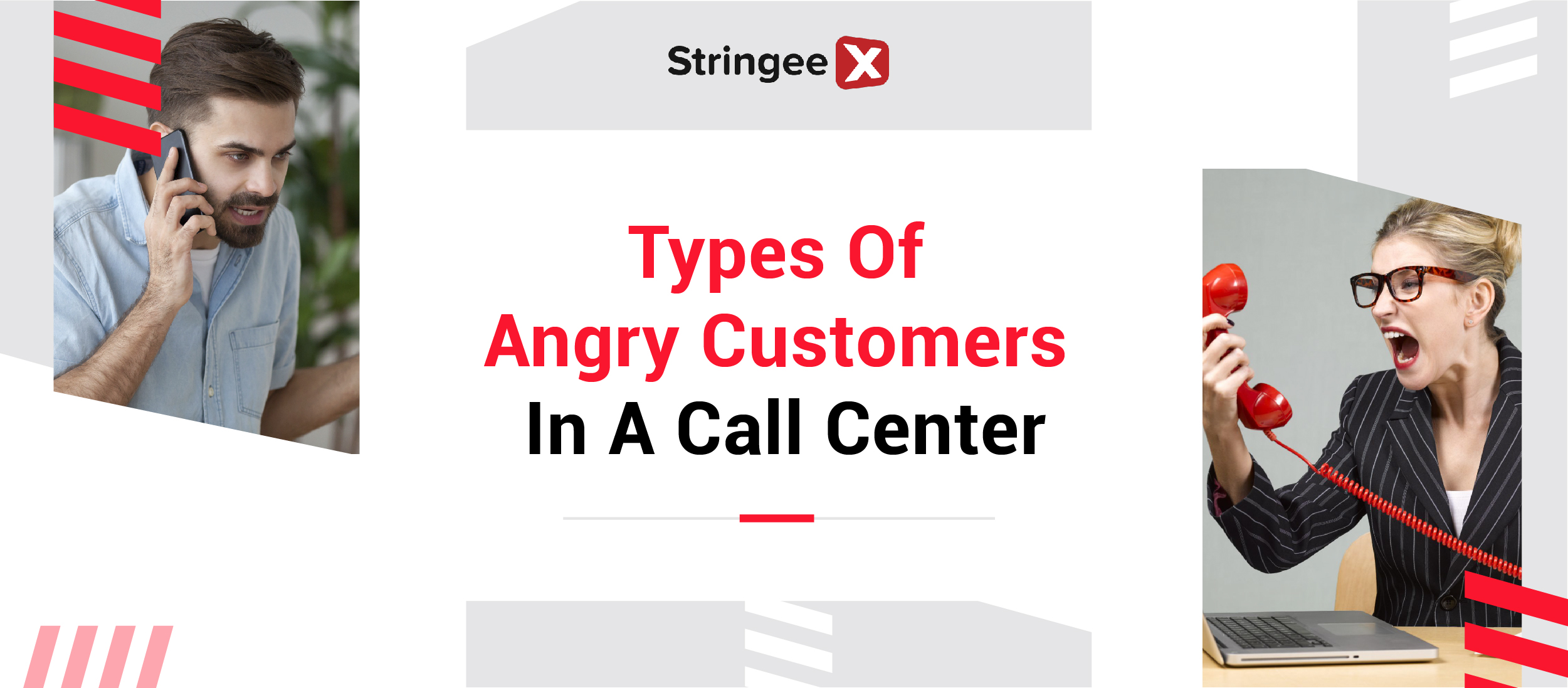Anyone who has ever worked in customer service would understand that clients are a diverse group. There are those people who are just kind enough and polite enough. Then there are the challenging ones who believe everything should revolve around them.
You are also aware that answering service calls from irate consumers is difficult. Different people behave differently. However, there are strategies for handling these challenging clients. The secret is to spot early and fulfill them with the appropriate communication form. Then you may make these dregs into champions.
This article can help you to identify types of angry customers in a call center and deal with them professionally.
Types Of Angry Customers In A Call Center

Dealing with angry customers is a nerve-wracking task.
An Abusive Customer
An abusive customer is an interesting type that can be recognized by its distinctive high pitch and liberal use of obscenities.
As paradoxical as it may sound, many agents eagerly await calls from this category of client. Why? Well, the unusual appearance of the Vulgarian seems to present an excellent opportunity to end the call because corporations have a duty of care to their staff to safeguard them from customer abuse.
However, it is the industry norm for agents to warn abusive consumers at least three times before discontinuing the discussion, even though no employee should be expected to put up with personal insults. However, several words and phrases might promote calm.
There can be no justification for insulting a customer as this would be considered gross misbehavior, even if done in reprisal. Of course, far more significant than the language used is the agent's ability to maintain composure under pressure. Therefore, in addition to promoting professional language, train your team on the emotional side of handling aggressive callers.
Examples of how to deal with abusive customers:
- Although I completely appreciate your situation, Sir/Madam, the kind of language you are using is intolerable.
- You seem very upset, sir/madam. Would you rather that we give you a call back when you feel better?
- I am regretful that you're upset, Sir/Madam. I'm doing everything I can to help you with your troubles.
- You certainly appear disturbed, Sir/Madam. Would you prefer that we continue our talk by mail or email for your convenience?
- My sincere apologies, Sir/Madam. However, if you keep using harsh words, I'll have to regretfully end our call.
An Offloader
This type of caller will most likely have no valid complaint about your company. Instead, he or she will have recently had a personal hardship and, lacking somebody with whom to vent, will turn to take their frustration out on your personnel. This frequently entails blown out of proportion even the smallest of complaints.
This kind of caller is one of the most annoying for a contact center employee because they have probably dealt with clients who were angry in the past and may feel that "mollycoddling" an Offloader is a waste of time and effort. Nevertheless, the caller should be treated seriously and formal, sympathetic language should always be utilized.
Examples of how to deal with offloaders:
- As an alternative, we can assist you with...
- Sir/Madam, I deeply regret that you are experiencing this.
- What I can do for you right now is...
- Should I suggest...?
- Your suggestions are greatly appreciated, Sir/Madam.
A Legitimate Grievance

Agent should escalate a call from a legitimate grievance to the closest supervisor.
Errors occur; they are a part of life and are pardonable. However, occasionally businesses fall so far short of their SLAs that even the most seasoned incoming agents have trouble appreciating the scope of the failure.
The topic of legitimate grievance is by far the most significant one covered in this list. Your consumer has been gravely letting down, and if the situation is made public on social media, it could have negative repercussions for your company.
Naturally, agents should immediately escalate the call to the closest team supervisor if they come across this type of complainant. But in the interim, it wouldn't hurt to say a few encouraging and sympathetic words...
Examples of how to deal with legitimate grievances:
- I'll try my best to help you with this problem...
- Thank you so much for alerting us to such an error on our part, Sir/Madam.
- Sir/Madam, I completely comprehend how you are feeling right now.
- Sir/Madam, I really apologize that you must deal with this awful situation.
A Threat Maker
A threat maker, who is frequently mistaken for the abusive one, is a completely separate kettle of fish. The goal of the former is to physically or emotionally intimidate the call operator until they stop, whilst the latter wants to placate them.
Naturally, the majority of agents have dealt with enough Threat-Makers to know that, despite their obstinate self-belief, the vast majority of threats made are as hollow as a church on a Monday morning. Many telephone operators, however, consider this complainant's methods to be the most offensive of all upset callers.
As a result, it's critical to emphasize to staff once more that they should not respond violently to threats; doing so would only give the caller more leverage and support for a potentially baseless complaint.
The only way to prevail over the Threat-Maker is to stand your ground; any compensation you make will merely help to incite more complaints in the future. Furthermore, it's critical to keep in mind that every single one of your consumers is a crucial source of income for your company, regardless of how disagreeable they may be personally.
Agents should aim for the sweet spot between cool-headed professionalism and compassion for the client's situation.
Examples of how to deal with threat makers:
- Sir/Madam, I sincerely apologize for the difficulty you had to endure...
- I need a moment, Sir/Madam, to find a solution to your issue, so please pardon me.
- Sir/Madam, I strongly urge you to [make this recommendation] so that we can go forward with our plans as soon as feasible.
- Please accept my sincere gratitude for helping you, Sir/Madam.
>>> Read more: How To Handle Angry Customers In A Call Center?
Conclusion
Now you've known the 4 main types of angry customers in a call center including an abusive customer, an offloader, a legitimate grievance, and a threat maker. Each type has specific characteristics which need different techniques to comfort them.
These methods enable you to shorten handling times while simultaneously enhancing customer service. Additionally, StringeeX can help you deal with and handle irate consumers more successfully if you need equipment with extensive telephony options.










